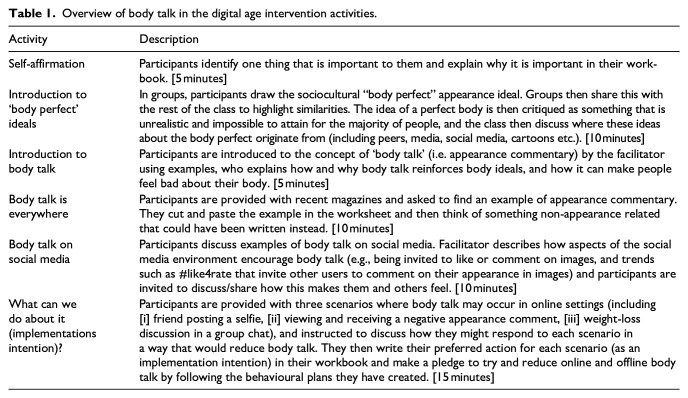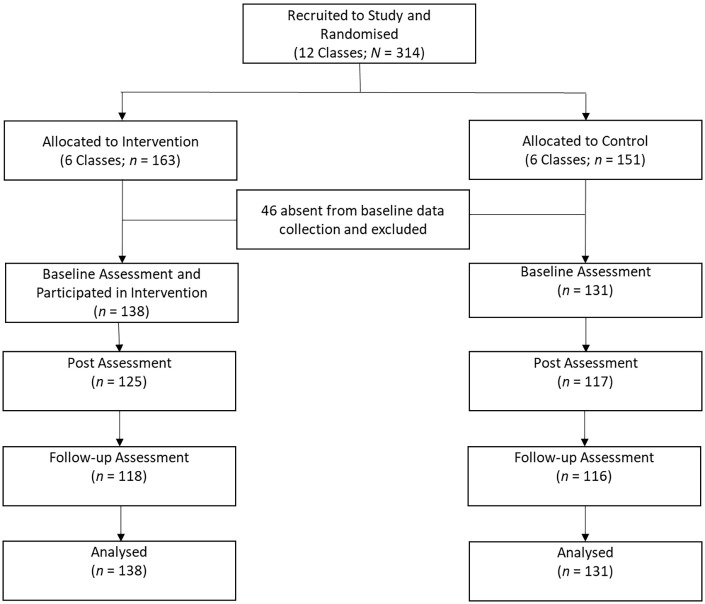数字时代的身体谈话:对减少外貌评论和改善身体形象的课堂干预的对照评估。
IF 1.7
Q3 PSYCHOLOGY, CLINICAL
Health Psychology Open
Pub Date : 2021-05-29
eCollection Date: 2021-01-01
DOI:10.1177/20551029211018920
引用次数: 4
摘要
本研究评估了以课堂为基础的干预-数字时代的身体谈话(BTIDA) -在减少青少年的外表评论和改善身体形象方面的效果。英国青少年(N = 314;年龄范围= 12-14岁)随机分为干预组或等候组。在基线(T1)、干预后1周(T2)和8周(T3)完成外貌评价、外表理想内化、自我物化和身体满意度的测量。多层次模型显示,与对照组相比,接受BTIDA的女孩在T2和T3时报告的外表评论参与度和理想内化程度较低,支持BTIDA对女孩的部分功效。在男孩中没有发现干预效果。本文章由计算机程序翻译,如有差异,请以英文原文为准。



Body talk in the digital age: A controlled evaluation of a classroom-based intervention to reduce appearance commentary and improve body image.
This research evaluates the efficacy of a classroom-based intervention – Body Talk in the Digital Age (BTIDA) – in reducing adolescents’ appearance commentary and improving body image. British adolescents (N = 314; Age Range = 12–14) were cluster randomised to intervention or waiting-list control groups. Measures of appearance commentary, appearance ideal internalisation, self-objectification and body satisfaction were completed at baseline (T1), then one-week (T2) and eight-week (T3) post-intervention. Multi-level modelling showed girls who received BTIDA reported less appearance commentary engagement and thin ideal internalisation at T2 and T3, than the control, supporting the partial efficacy of BTIDA for girls. No intervention effects were found among boys.
求助全文
通过发布文献求助,成功后即可免费获取论文全文。
去求助
来源期刊

Health Psychology Open
Psychology-Clinical Psychology
CiteScore
5.90
自引率
0.00%
发文量
7
审稿时长
12 weeks
期刊介绍:
Health Psychology Open (HPO) is an international, peer-reviewed, open access, online-only journal providing rapid publication. HPO is dedicated to publishing cutting-edge research in health psychology from around the world. HPO seeks to provide a platform for both traditional empirical analyses and more qualitative and/or critically oriented approaches to health psychology. All areas of health psychology are covered, but these topics are of particular interest: Clinical health psychology Critical health psychology Community health psychology Health psychology practice Health psychology through a social, cultural or regional lens The journal particularly favours papers that focus on health psychology in practice, including submissions concerning community and/or clinical applications and interventions. Review articles are also welcomed. There is no fixed limit to the length of manuscripts, which is normally strictly limited in other journals, for example HPO’s sister journal, Journal of Health Psychology (JHP). Studies published in this journal are required to obtain ethical approval from an Institutional Review Board. Such approval must include informed, signed consent by all research participants. Any manuscript not containing an explicit statement concerning ethical approval and informed consent will not be considered.
 求助内容:
求助内容: 应助结果提醒方式:
应助结果提醒方式:


